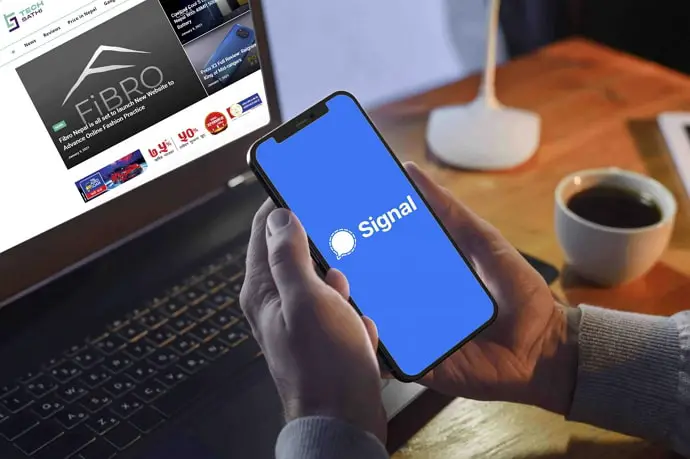Signal is a highly secure and privacy-focused messaging app that has gained significant popularity in the last few years. Its commitment to user data protection and encryption has made it a well-loved choice among users. With a robust set of features, Signal aims to provide a secure and private messaging experience for individuals and groups. One of the standout features of Signal is its end-to-end encryption.

All messages, voice calls, video calls, and file transfers on Signal are encrypted; this ensures that only the intended recipients can access the content. This means that not even Signal itself can access the content of your communications, adding a strong layer of privacy and security.
Signal also offers advanced security features such as self-destructing messages. Users can set a timer for their messages, after which they automatically disappear from both the sender’s and recipient’s devices. This feature enhances privacy and can be useful for sharing sensitive or temporary information.
In addition to secure messaging, Signal supports voice and video calls with the same end-to-end encryption. This ensures that your conversations remain private and protected from interception or eavesdropping. Signal’s voice and video call quality are also top-notch, making it a viable option for secure communication.
With all this focus on the security and privacy of users, you might wonder if you can track someone’s real-time location on Signal. If you are curious about this, keep reading!
In this blog, we will discuss whether we can track someone’s location on Signal, and if yes, then how? Let’s get started!
How to Track Someone’s Location on Signal?
Signal is a secure messaging app that prioritizes user privacy and security. Therefore, it does not provide built-in features for location tracking or sharing the real-time location of its users. The platform is designed to protect the privacy of its users by encrypting communications and minimizing data collection.
Signal focuses on secure messaging and communication, ensuring that your conversations remain encrypted and protected. However, Signal does allow you to share your location manually if you choose to do so. We will discuss this further in the blog.
Other than that, it does not provide any means for automatically tracking or accessing the real-time location of its users. If you need to know someone’s location for legitimate purposes, you may ask the person directly or use a different platform or service that explicitly offers location-sharing features.
Although, you should remember to respect the privacy and consent of individuals when it comes to sharing location information, as it is extremely important. Now, while you cannot access someone’s real-time location on the platform without their permission, you can view it if they choose to share it with you.
If someone has given you their consent to track their location on Signal, you can follow these steps to enable location sharing:
Step 1: Open Signal on your device.
Make sure that you have a Signal account and log in to it.
Step 2: Begin a conversation with the person whose location you want to track.
This can be an existing conversation or a new one.
Step 3: Look for the + icon; this is usually located in the text input field or the toolbar of the conversation screen.
Step 4: Tap on it to reveal additional options.
Step 5: From the list of options that appear, choose the Location option.
This will open the location-sharing feature.
Step 6: Select the desired duration for which you want to track the person’s location.
Signal offers options such as 15 minutes, 1 hour, 8 hours, or 24 hours. You can select the appropriate time frame based on your needs.
Step 7: Once you’ve chosen the duration, tap the Send or equivalent button to send the location request to the person.
They will receive a notification asking if they want to share their location with you for the specified duration.
Step 8: The person can choose to accept or decline the location-sharing request.
If they accept, their location will be shared with you for the specified duration.
Now, once the person has consented and started sharing their location, you will be able to see their location updates within the Signal app. The frequency and accuracy of location updates may depend on various factors, such as the person’s device settings and signal strength.
You must always remember to obtain explicit consent from the person you wish to track the location of. You must respect their privacy and ensure that they are comfortable with sharing their location information with you. Communication and consent are key when it comes to tracking someone’s location, even with their permission.
Signal puts a lot of effort into prioritizing the privacy of its users. It does so by collecting minimal user data. It only requires a phone number for registration, and even that is not linked to your identity within the app. Signal’s commitment to data minimization and privacy has earned it a reputation as a trusted platform among privacy-conscious individuals.
Furthermore, Signal has a feature called Screen Security that prevents your messages from being captured in screenshots or screen recordings by other apps on your device. This feature helps to maintain the privacy and confidentiality of your conversations.
To wrap it up
That brings us to the end of this blog. Let’s quickly go through everything we have learned today to wrap it up. We began our discussion by talking about Signal as a popular messaging app that has been seeing a consistently growing user base.
We then discussed its various features and attributes that make it stand out. Next, we determined whether you can track someone’s location on Signal, the answer to which is No. Signal doesn’t have an inbuilt feature to track someone’s location.
However, you can do so if the user has given you access to their location. We discussed how you can track someone’s location, given that you have permission to do it.
With this, we hope we were able to resolve all your doubts and queries about location tracking on Signal. If you have any more questions you would like us to address, feel free to drop them in the comments below.
We will make sure to address them in our upcoming blogs, as always!
Also Read:





 Bitcoin
Bitcoin  Ethereum
Ethereum  Tether
Tether  XRP
XRP  Solana
Solana  USDC
USDC  Dogecoin
Dogecoin  TRON
TRON  Cardano
Cardano